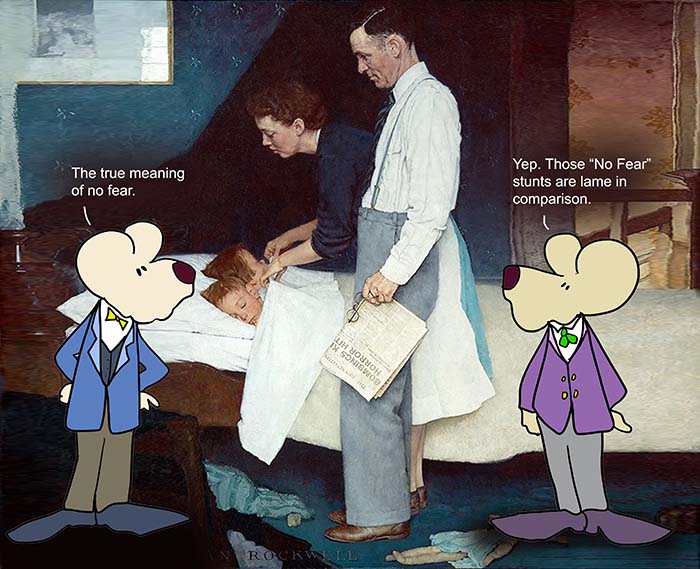Years ago, there was a Norman Rockwell Exhibit that was traveling across the United States. It was comprised mostly of all the covers he had created for Saturday Evening Post Magazine. A total of 321 magazine covers. It made a stop at the Dayton Art Institute in Dayton, Ohio.
I bought tickets so I could take my parents, as my Dad was a huge fan of Norman Rockwell’s work. It was a clan of us. My Mom was on a different pace than Dad, and she hurried through. Luckily, my brother and his wife went with us that day, and they took charge of my Mom. I stayed with Dad, and Mary played the in-between, keeping track of all heads.
Anyway, Dad and I took our time and enjoyed each cover. However, when we got to the display covering Roosevelt’s Four Freedoms, my Dad stopped and took an extended amount of time. He read every word on every plaque. He stayed there, thinking, contemplating, remembering.
I’ve mentioned before that my Dad served in WWII on the European Front. It was an experience that altered his life. He was deeply touched by the things he saw and did there during those years. As such, he was extremely adamant when it came to matters of freedom and responsibility therein.
As you see, freedom is much more than a privilege. A right. It is also a responsibility.
All of this comes to me, as this was the date, January 6, 1941, when President Franklin Roosevelt made his “Four Freedoms” speech. These are the freedom of speech and worship. The freedom from want and fear. He gave this oration during his State of Union address.
What a speech. It is the only one in American history that inspired a lot of spinoffs. Books and films. And, of course, paintings.
The back story is important. It helps us to fully understand the historical context of this speech. We know he was the only president elected to three terms. Things were rocky in the world. There were incredible dangers, instabilities, and war.
Most of Europe had fallen to the Nazis. Great Britain was only holding on by a thin thread. On the east end, the Japanese Empire brutally occupied much of China and East Asia.
Many Americans opposed getting involved in this immensity of messes, this war. But, Franklin D. fully understood Britain’s desperate need for American support. He was committed to convincing the United States that we needed to help our closest ally, England.
So, he made his speech. Roosevelt presented his reasons for American involvement. He made the entire case, including the greater production of war industries at home. But more than anything, he said that in helping Britain, the United States was truly fighting for the universal freedoms that all people deserved.
Yes. We entered that war. And this speech helped the cause. Those “four freedoms” – the freedom of speech, the freedom of worship, the freedom from want, and the freedom from fear. These embodied our freedom. They symbolized America’s war aims. And they also gave people hope in the following years. Everyone was war-wearied following the struggle. Yet, Roosevelt’s words reminded people of what they were fighting for freedom.
With this amazing thing, freedom, we must realize that everyone is in this. Not just us as individuals. In addition, this privilege holds hand with responsibility. We must be held accountable for our actions. We must consider others’ freedoms.
With liberty and justice. For all.
==========
“People demand freedom of speech as a compensation for the freedom of thought which they seldom use.”
― Søren Kierkegaard
===========
“Those who deny freedom to others, deserve it not for themselves”
― Abraham Lincoln
===========
“For to be free is not merely to cast off one’s chains, but to live in a way that respects and enhances the freedom of others.”
― Nelson Mandela
==========
Four Freedoms. And 315 million freedoms.
